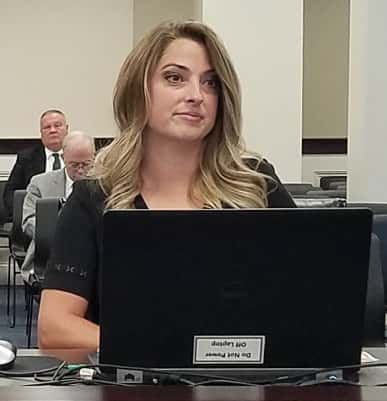
Separating the County Employees Retirement System from Kentucky Retirement Systems was debated at a meeting Monday of the Kentucky Retirement Systems Administrative Subcommittee.
Representatives from the Kentucky Association of Counties, Kentucky League of Cities, Kentucky School Boards Association, Kentucky Association of School Superintendents and Kentucky Professional Firefighters, all members of CERS, testified on behalf of the separation.
The CERS is the largest system within KRS, with 236,000 members and $13.9 billion in assets, said Bryanna Carroll, the Kentucky League of Cities manager of governmental affairs. Yet they lack proper representation, she said.
“Despite being the largest system with 75 percent of the money and 63 percent of the membership, CERS only has 35 percent representation on the KRS Board – six of the 17 members,” she said.
Carroll also said they have only one of nine seats on the KRS investment committee and only one of seven seats on the actuarial committee.
Carroll testified that CERS has outperformed KRS when it comes to rate of return on investments, with an increase averaging 8.68 percent since 2001. “And it is the Kentucky Employees Retirement System, not CERS, that has seen total investments decline on average of 1.5 percent per year since Fiscal Year 2001.”
She also complained that KRS administrative costs have gone up 247 percent between 2000 and 2018. “This is significant as CERS pays 63 percent of those administrative costs due to our membership.”
That amounted to $20 million of the $32 million in administrative costs for the fiscal year that ended June 30, according to Carroll. Twenty-five local agencies support their request for separation, she said.
Larry Totten. president of Kentucky Public Retirees, was among those expressing concerns about separation.
“Everyone in the legislative process, from members of this subcommittee to the governor, must answer the question: Will the action I take or don’t take harm those for whom these pensions were created?”
While saying the KPR had no final opinion on the proposal, Totten said there are serious issues.
“First and foremost, there must be a complete analysis on the effects of CERS separation, in terms of actuarial, financial and administrative impact,” Totten said. “To put it colloquially, this would be the mother of all divorces. And it is incumbent upon the legislature to investigate a potential post-separation landscape.”
He said a prior legislative proposal did not have such an analysis or was not publicly released if one existed. “An evaluation for such a dramatic change should go much further and begin as soon as possible, so there’s time for a further review.”
Noting that the subcommittee was created as part of Senate Bill 151, the public pension reform bill, on which the Kentucky Supreme Court heard oral arguments last week, Totten said if the bill is ultimately found to be unconstitutional, lawmakers should re-establish the panel as soon as possible, so that their work can continue.
(Photo: Bryanna Carroll, of the Kentucky League of Cities, courtesy of Kentucky Today)
By Kentucky Today








